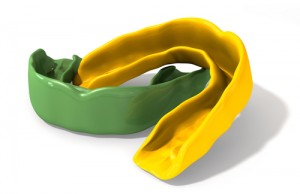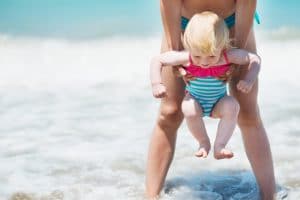
Baby Hints and Tips dental expert, Dr James Moulaf, explains why a mouthguard is the best way to prevent and minimise risk when playing contact or physical sports.
Kids love to run, jump, hop, wrestle and swim and they certainly, at times, possess the energy to do all at once. When children approach a certain age, participating in team or individual sports present fantastic opportunities to channel that energy, make friends, get fit and grow.
Unfortunately, injuries and kid’s sport are synonymous themes. The most common affliction in kid’s sport hails from the dental genre. A report by Dennis McTigue a Professor of Pediatric Dentistry and Amy Thompson an Assistant Professor of Pediatrics, scarily highlights that 50% of all children will encounter some kind of dental injury – with one of the major causes being sporting injuries.
Worried about your child picking up a football? Breathe. Luckily, there are thousands of children running around today, who will never experience dental hardship as a result of playing contact sport.
Children and their teeth
Every child varies in when they lose their baby teeth and when their adult teeth start sprouting. Generally speaking, children begin to grow new teeth around the age of 6, to as late as 10. Regardless of the stage they’re in, it’s very important that safety is optimised to protect the natural progression of losing baby teeth to safeguarding the adult additions.
Why?
The most prominent dental injury from kid’s sport involves the big front teeth. Medicinally known as maxillary central and lateral incisors, kids tend to grow these in the prime of their young sporting life, between the ages of 7 to 9. If a child was to lose one of these, it’s straight to the bank. Replacing an adult tooth for a child can be an expensive and painful experience with costs being potentially north of $6,000 to $7,000.
Damage to teeth or jaw injuries, even at a young age, can lead to long term problems. A heavy facial collision in sports can lead to tissue, bone or structural damage which can require extensive surgery and ongoing treatment to restore teeth and configuration.
How to avoid this?
Prevention is the best medicine in this scenario – prevention in the form of a mouthguard.
Do mouthguards help protect your teeth?
In short, yes. They don’t guarantee 100 per cent safety, but they certainly guarantee significantly minimising impact from any teeth, jaw or head related injuries while playing sports. There’s a reason the top athletes running around still sport them when competing in their respective domains.
The Australian Dental Association strongly recommends that young children and adults of all ages participating in sports like rugby, netball, boxing, basketball, or sports where collisions happen unexpectedly, like BMX and horse riding, wear mouthguards.
How do mouthguards work?
Mouthguards don’t deflect or block collisions to the face. Their primary role is to act as a shock absorber when experiencing considerable impact to the facial region. Mouthguards are made up of flexible and compressive material which slows down impact over a longer period. That means force in a collision to the face spreads over a greater area, with the mouthguard consuming a considerable proportion of the blow, instead of teeth and other oral body parts. The thicker the material, the more it can compress and the more force it can absorb from impact. In short, the mouthguard is designed to cop the flak, not the head.
What type of mouthguard to use for kid’s sport?
When it comes to mouthguards, there are generally two sorts on offer; custom-made and over-the-counter (OTC).
What is the best option for protecting your child’s teeth?
Custom-made. Multiple sources highlight that Custom-made is far and away the safest source of mouth and teeth protection for contact sports. A study conducted by the Academy of General Dentistry in America found that football players wearing OTC were twice as likely to suffer brain trauma and concussions than those wearing custom made, properly fitted mouthguards. It goes to show that mouthguards protect more than just teeth. The Australian Dental Association strongly advises against the use of OTC mouthguards, and advocates the use of Custom, dentist fitted mouthguards. Custom-fitted mouthguards are more expensive, but for a reason. The investment outweighs the risk.
Worst case scenario: what to do if your child loses a tooth?
Despite the effectiveness of mouthguards and the safety and protection they can afford, accidents can happen. The thought of a young one or child losing a tooth can be a pretty overwhelming and scary prospect. However it’s not the end of the world. If it is a baby tooth, then it was on its way or just came out early. Best to apply a tissue or two and a few salt water rinses. For an adult tooth in a child, do your best to locate it and hold onto, seeking dental assistance as soon as possible. In these situations, time is critical.
Kids love having fun and sport offers a great outlet. Equip them safely and let them enjoy themselves.













